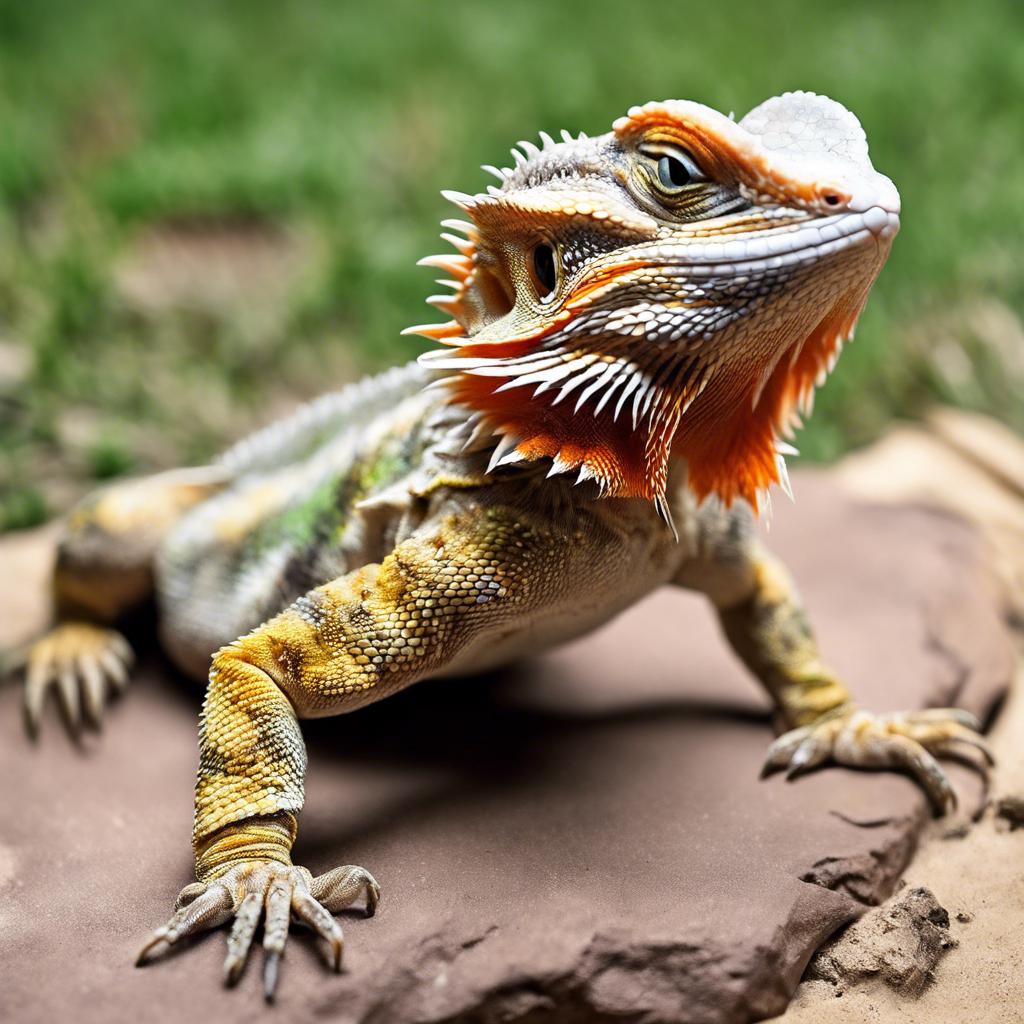Bearded dragons are popular pets known for their unique appearance and docile nature. However, many owners may not be aware of the importance of a proper diet for these reptiles. A balanced diet is crucial for the overall health and well-being of bearded dragons, as it provides them with the necessary nutrients to thrive. In this article, we will explore the nutritional needs of bearded dragons, the types of insects and vegetables they should consume, and how to properly hydrate them.
Key Takeaways
- Bearded dragons require a balanced diet of insects and vegetables to maintain optimal health.
- Insects should make up the majority of a bearded dragon's diet, with a variety of options available such as crickets, mealworms, and dubia roaches.
- Insects should be gut-loaded and dusted with calcium and vitamin supplements before feeding to ensure proper nutrition.
- Vegetables should be offered daily, with options such as collard greens, kale, and squash being good choices.
- Adequate hydration is important for bearded dragons, with fresh water available at all times and occasional misting or soaking to promote hydration.
Understanding Bearded Dragon Nutritional Needs
Bearded dragons have specific nutritional needs that must be met in order for them to stay healthy. These reptiles require a diet that is high in protein, calcium, and vitamins. Protein is essential for growth and development, as well as muscle function. Calcium is necessary for strong bones and teeth, while vitamins help support various bodily functions.
It is important to provide a balanced diet for your bearded dragon to ensure they receive all the necessary nutrients. A diet that is too high in protein can lead to kidney problems, while a diet lacking in calcium can result in metabolic bone disease. By offering a variety of foods that meet their nutritional needs, you can help prevent these health issues and promote optimal health for your bearded dragon.
Feeding Bearded Dragons Insects
Insects are an important part of a bearded dragon's diet. They provide a source of protein and other essential nutrients that are necessary for their growth and overall health. Insects also stimulate natural hunting behaviors in bearded dragons, which can help keep them mentally stimulated.
When feeding insects to your bearded dragon, it is important to choose ones that are safe and healthy for them to eat. Avoid feeding wild-caught insects, as they may have been exposed to pesticides or other harmful substances. Instead, opt for commercially bred insects that are specifically raised as feeders for reptiles.
Types of Insects to Feed Bearded Dragons
There are several types of insects that are safe and healthy for bearded dragons to eat. Some of the most commonly fed insects include crickets, mealworms, and dubia roaches. Each type of insect offers its own nutritional benefits.
Crickets are a staple in a bearded dragon's diet. They are high in protein and can be easily gut-loaded with nutritious foods to enhance their nutritional value. Mealworms are another popular choice, but they should be fed in moderation due to their high fat content. Dubia roaches are a nutritious option that is low in fat and high in protein, making them an excellent choice for bearded dragons.
Preparing Insects for Bearded Dragons
Before feeding insects to your bearded dragon, it is important to properly prepare them. This includes gut-loading the insects and dusting them with supplements.
Gut-loading involves feeding the insects a nutritious diet for at least 24 hours before offering them to your bearded dragon. This ensures that the insects are packed with nutrients that will be passed on to your pet when they eat them.
Dusting the insects with supplements is another important step in preparing them for your bearded dragon. Calcium powder should be dusted onto the insects at every feeding to ensure your pet receives enough calcium. Multivitamin powder can also be dusted onto the insects a few times a week to provide additional vitamins and minerals.
Frequency of Insect Feeding for Bearded Dragons

The frequency of insect feeding for bearded dragons depends on their age and size. Younger dragons require more protein and should be fed insects daily, while adult dragons can be fed every other day or a few times a week.
A sample feeding schedule for a young bearded dragon might include offering them as many appropriately sized crickets as they can eat in 10-15 minutes, three times a day. As they grow, the number of feedings can be reduced to two times a day, and eventually to once a day. Adult bearded dragons can be fed every other day or a few times a week, depending on their size and activity level.
Supplementing Bearded Dragon Diets with Vegetables
In addition to insects, vegetables should also be included in a bearded dragon's diet. Vegetables provide important vitamins and minerals that are necessary for their overall health. They also help provide fiber, which aids in digestion.
Some safe and healthy vegetables to feed your bearded dragon include collard greens, mustard greens, dandelion greens, and butternut squash. These vegetables are high in calcium and other essential nutrients. It is important to offer a variety of vegetables to ensure your bearded dragon receives a well-rounded diet.
Hydration and Water Needs for Bearded Dragons
Proper hydration is crucial for the health of bearded dragons. They require access to fresh water at all times, which can be provided through a shallow dish placed in their enclosure. Bearded dragons may also benefit from regular misting, as they will often lick water droplets off their skin.
Dehydration can be a serious issue for bearded dragons and can lead to health problems if not addressed. Signs of dehydration include sunken eyes, wrinkled skin, and lethargy. To prevent dehydration, make sure your bearded dragon has access to fresh water at all times and mist their enclosure regularly.
Bearded Dragon Health Issues Related to Diet
An improper diet can lead to various health issues in bearded dragons. One common problem is metabolic bone disease (MBD), which is caused by a lack of calcium in the diet. MBD can result in weak bones, deformities, and even death if left untreated.
Obesity is another health issue that can arise from an improper diet. Bearded dragons that are fed too much or are given high-fat foods can become overweight, which can lead to a range of health problems.
To prevent these health issues, it is important to provide a balanced diet that meets the nutritional needs of your bearded dragon. This includes offering a variety of insects and vegetables, as well as properly supplementing their diet with calcium and vitamins.
Conclusion and Summary of Bearded Dragon Care and Diet
In conclusion, a proper diet is essential for the health and well-being of bearded dragons. They require a balanced diet that includes a variety of insects and vegetables to meet their nutritional needs. Insects provide protein, while vegetables offer important vitamins and minerals. It is also important to properly hydrate your bearded dragon and provide access to fresh water at all times.
By following a proper diet and nutrition plan, you can help prevent common health issues such as metabolic bone disease and obesity. It is important to continually educate yourself on the care and nutrition needs of bearded dragons to ensure they live long, healthy lives.
If you're wondering what insects to feed your bearded dragon, it's important to consider their nutritional needs. While crickets and mealworms are commonly recommended, there are other options worth exploring. In a recent article on Reptile Wizard, they discuss the benefits of feeding bearded dragons black soldier fly larvae. These nutritious insects are high in protein and calcium, making them an excellent addition to your pet's diet. To learn more about this alternative insect option, check out the article here.
FAQs
What are bearded dragons?
Bearded dragons are a type of lizard that are commonly kept as pets. They are native to Australia and are known for their distinctive appearance, which includes a spiky beard-like protrusion under their chin.
What do bearded dragons eat?
Bearded dragons are omnivores, which means they eat both plants and animals. In the wild, they eat a variety of insects, as well as fruits and vegetables. In captivity, they can be fed a diet of live insects, such as crickets and mealworms, as well as leafy greens and other vegetables.
What insects can bearded dragons eat?
Bearded dragons can eat a variety of insects, including crickets, mealworms, waxworms, superworms, and roaches. It is important to ensure that the insects are gut-loaded, which means they have been fed a nutritious diet before being fed to the bearded dragon.
Can bearded dragons eat wild-caught insects?
It is generally not recommended to feed bearded dragons wild-caught insects, as they may have been exposed to pesticides or other harmful substances. It is best to purchase insects from a reputable supplier and ensure that they are healthy and nutritious.
How often should bearded dragons be fed insects?
Bearded dragons should be fed insects daily when they are young, and every other day when they are adults. The amount of insects they should be fed depends on their size and age, but a general rule of thumb is to feed them as many insects as they can eat in 10-15 minutes.
What vegetables can bearded dragons eat?
Bearded dragons can eat a variety of vegetables, including collard greens, kale, mustard greens, turnip greens, and dandelion greens. They can also eat vegetables such as squash, carrots, and sweet potatoes. It is important to avoid feeding them vegetables that are high in oxalates, such as spinach and beet greens.

